Tag Archive: hybrid
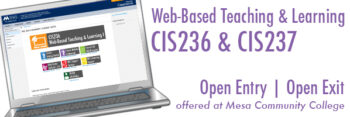
Prepare to Teach Online with CIS 236 & 237 at Mesa Community College this Summer
The CIS 236 and CIS 237 series is designed to help you get started in teaching & learning in the hybrid and online formats. First, experience the ‘student’ perspective and discover new digital teaching tools in CIS 236 and then explore course design and content creation in CIS 237. Instructors will complete the series with practical tips, researched pedagogy and a duplicative structure for building and facilitating an online or hybrid format class.
Advantages of the Open Entry / Open Exit Format
Mesa Community College is offering CIS236 and CIS237 in the Open Exit/Open Exit format for the Summer 2014.
Flexible Learning!
- Pick your own start date (5/27 – 6/6)
- Set your own pace over an 8 week period
- No hard deadlines.
Enroll Today
Enrollment through My.Maricopa.edu.
- Complete your Student Information Form
- Register for Class
- Pay for the course, Learn About MCCCD Tuition Waivers: http://www.maricopa.edu/publicstewardship/resources/tw.php
If you have difficulties registering or have questions about these courses, contact the instructor:
CIS 236: Web Based Teaching & Learning I (2 credits), Section #16276
Experience using a web-based learning environment from an online student’s perspective. Use communication tools, submit assignments, use evaluation tools, and navigate an online-learning environment. Introduction to the basics of online pedagogy and lots of hands-on experience with a web-based learning environment and digital teaching tools! Prerequisites: CIS133CA or CIS 133DA, or permission of instructor. Contact instructor for override code.
- Offered fully online during Summer 2014 (Open Entry/Open Exit) – Choose a start date between May 27 and June 6. Students will have 8 weeks to finish the course from the start date.
CIS 237: Web Based Teaching & Learning II (3 credits), Section #16277
Discuss theories, methods, and best practices for designing, developing, and delivering an online course including Classroom Assessment Techniques, Flipped Classroom, Quality Matters and more. Create an online or hybrid course module using a web-based learning environment. Prerequisites: CIS 236, or permission of instructor. Contact instructor for concurrent enrollment code (allowing students to take CIS236 and CIS237 simultaneously).
- Offered fully online during Summer 2014 (Open Entry/Open Exit) – Choose a start date between May 27 and June 6. Students will have 8 weeks to finish the course from the start date.
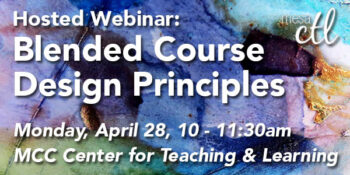
Webinar: Blended Course Design Principles
Monday, April 28, 10:00 – 11:30 a.m. *
Hosted by the MCC Center for Teaching & Learning, Southern & Dobson Campus, AS Building Room 175, Register Now
When executed properly, blended courses provide a high level of engagement from learners and establish measurable learning outcomes with the means for achieving them. How are you ensuring that the blended courses you are designing combine the best components of both online and face-to-face classes? Join us in the MCC CTL for a discussion around blended course design principles and how they align with instructional strategies.
Sponsored by the MCCCD MCLI.
Presented by: Academic Impressions
Dr. Denise Lowe; Instructional Design Team Lead,
Center for Distributed Learning University of Central Florida
*Note: This session is hosted at the MCC Center for Teaching & Learning. You must come to the Center to participate.
Who Should Attend
Instructional designers, faculty, and faculty developers who are at the beginning or intermediate stages of blended course development will benefit from this program. You will leave with key steps to using sound instructional design strategies to design, organize, and assess your courses. Learn more.
MCC Hosted Session
Monday, April 28
10:00 – 11:30 a.m.
AS Building, Room 175
FREE
About the MCC CTL
The mission of the MCC Center for Teaching & Learning is to lead and inspire the advancement of innovative teaching and learning for student success. Learn more about the CTL staff and programs at ctl.mesacc.edu.
Visit the CTL Calendar for dates for all upcoming sessions.
Mark Your Calendar for MCC’s 5th Annual Camp Innovate
The MCC Center for Teaching & Learning’s 5th Annual Camp Innovate is just a little more than a month away. Please air out your tent and grab your gear to participate in this exciting week of sessions around the campfire of innovative teaching and learning; Monday, May 19 – Thursday, May 22. Stay-tuned as this engaging week develops.

Join Our Session on April 4
Quality Matters (QM) is a nationally recognized, faculty-centered, peer review process designed to acknowledge the quality of online/hybrid courses. The QM framework (Rubric) is about course design, and making your course navigation and structure intuitive, so that students’ questions will be more focused on the content of your course. Research supports that QM recognized courses improve both student learning outcomes, student success, and retention.
Applying the Quality Matters Rubric (APPQMR)
Friday, April 4, 9:00am – 4:00pm
CTL Lab, AS175
AS Building MCC Southern & Dobson Campus (Map)
COURSE#001515, Section #0006, register here
The Quality Matters course at MCC is designed to help you prepare your course for QM certification and is preparatory course for the QM Peer Reviewer Certification. This in-depth session explains each of the QM standards through hands-on activities. Participants will leave with tools and ideas to design your course to meet QM and skills to become a Quality Matters peer reviewer.
Who can attend this session?
Any MCCCD employee interested in using the QM Process at and Rubric to improve their existing course or to guide their design of a new course is welcome to attend.
How do I register for the Quality Matters at MCC course?
Use the link above or register here (new window will open). Registration is through the HRMS (MCCCD Time & Labor) system. View detailed registration instructions.
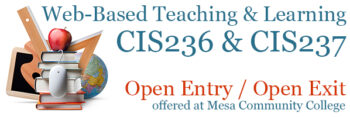
Take CIS 236 & 237 at Mesa Community College
The CIS 236 and CIS 237 series are designed to help you get started in teaching & learning in the hybrid and online formats. First, experience the ‘student’ perspective and discover new digital teaching tools in CIS 236 and then explore course design and content creation in CIS 237. Instructors will complete the series with practical tips, researched pedagogy and a duplicative structure for building and facilitating an online or hybrid format class.
Advantages of the Open Entry / Open Exit Format
Mesa Community College is offering CIS236 and CIS237 in the Open Exit/Open Exit format for the Fall 2013.
Flexible Learning!
- Pick your own start date
- Set your own pace over a 12 week period
- No hard deadlines.
Enroll Today
Enrollment through My.Maricopa.edu.
- Complete your Student Information Form
- Register for Class
Learn About MCCCD Tuition Waivers: http://www.maricopa.edu/publicstewardship/resources/tw.php
If you have difficulties registering or have questions about these courses, contact the instructor(s) listed below:
CIS 236: Web Based Teaching & Learning I (2 credits), Section #46044
Experience using a web-based learning environment from an online student’s perspective. Use communication tools, submit assignments, use evaluation tools, and navigate an online-learning environment. Introduction to the basics of online pedagogy and lots of hands-on experience with a web-based learning environment and digital teaching tools! Prerequisites: CIS133CA or CIS 133DA, or permission of instructor. Contact instructor for override code.
- Offered fully online during Fall 2013 (Open Entry/Open Exit) – Choose a start date between September 9 and November 9. Students will have 12 weeks to finish the course from the start date.
CIS 237: Web Based Teaching & Learning II (3 credits), Section #46045
Discuss theories, methods, and best practices for designing, developing, and delivering an online course including Classroom Assessment Techniques, Flipped Classroom, Quality Matters and more. Create an online or hybrid course module using a web-based learning environment. Prerequisites: CIS 236, or permission of instructor. Contact instructor for concurrent enrollment code (allowing students to take CIS236 and CIS237 simultaneously).
- Offered fully online during Fall 2013 (Open Entry/Open Exit) – Choose a start date between September 9 and November 9. Students will have 12 weeks to finish the course from the start date.
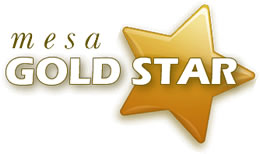
MCC Gold Star is looking for Mentees and Mentors for Fall 2013
The CTL in collaboration with the eLearning Committee would like to announce the Gold Star Program for Fall 2013. Gold Star is a faculty-centered, training and peer-review process to support MCC faculty developers (mentee) to redesign an existing Internet or hybrid course based on the QM Rubric. A total of 30 faculty will be selected to participate in the Gold Star program as Mentee applicants to include both individuals and/or collaborative teams.
Applications are now being accepted for:
Individuals – Faculty interested in re-designing an existing online or hybrid course.
Collaborative Teams – Inner-disciplinary or cross-disciplinary faculty interested in re-designing an existing online or hybrid course. Not to exceed more than 3 members per team.
Mentors – 30 faculty will be selected to participate in the Gold Star program as Mentors to support the Gold Star Mentees with the re-design of their online or hybrid courses.
Apply Now, applications due Friday, August 30, 5pm.
Gold Star Program Dates & Information:
Who should apply?
Mentee Applicant – any faculty member interested in redesigning their course to meet the QM Standards.
Mentor Applicant – Any faculty member interested in mentoring another faculty to redesign their course to meet the QM Standards.
Do I need to be a QM Peer Reviewer?
Mentee Applicant – No. You can complete the QM Peer Review Training this Spring if you want to become a mentor in the future. There are two parts. APPQMR & PRC.
Mentor Applicant – Yes. You have to be an approved QM Peer Reviewer or have completed the APPQMR training and currently working on the QM PRC course.
APPQMR Training Dates – Visit the CTL Calendar for Registration Info
- Face to Face – Friday, November 1, 9am – 4pm
- Online Course – Friday, October 18 – Friday, November 1

Will there be required training for Gold Star?
Mentee Applicant – Yes. You will need to attend the Curriculum Mapping and Instructional Design and TBA Design in Canvas Session.
Mentor Applicant – Yes. You will need to attend the Curriculum Mapping and Instructional Design and TBA Design in Canvas Session.
Training Dates – Visit the CTL Calendar for Registration Info
- Curriculum Mapping – Friday, September 6, 11am – 2pm OR Saturday, September 7, 8:30am – 11:30am.
- TBA Design in Canvas Session – Friday, September 27, 10am – 2pm
What is expected of me?
Mentee Applicant – Design your course to meet the QM Standard AND submit your course for an official QM review.
Mentor Applicant – Provide feedback about the design of the mentor’s course and complete an official QM Review of a GS course.
What are the Application Deadlines?
Mentors and mentees should submit their applications no later than Friday, August 30 at 5pm.
To learn more about the GS Program and to submit an application to become a Gold Star Mentee or Mentor, go to: Gold Star.
Is there a stipend?*
Mentee Completer – Yes, $800.00 will be awarded upon the course becoming GS approved and addition payment of $2oo.oo when the course is QM certified. (Contingent upon funding availability). No payment is made for those who do not successfully complete the process within the required time frame.
Mentor Completer – Yes, $800.00 will be awarded upon the course becoming GS approved and addition payment of $2oo.oo when the course is QM certified. (Contingent upon funding availability). No payment is made for those who do not successfully complete the process within the required time frame.
*Note: Gold Star events are not eligible for C.A.F.E.
Questions?
Learn more at the MCC Quality Learning Web Site or contact Annapurna Ganesh, the Gold Star Coordinator at aganesh@mesacc.edu or 480-461-7305.

CIS 236 & 237 are Now Offered as Open Entry
Interested in teaching online (or hybrid), but never taught these formats before? The CIS 236 and CIS 237 series, now offered as open enrollment, may help you get started in teaching & learning online. Experience the ‘student’ perspective in CIS 236 and then explore course design and content creation in CIS 237. If you have difficulties registering or have questions about these courses, contact the instructor(s) listed below.
Tuition Waivers may apply for Spring / Summer I faculty: http://www.maricopa.edu/publicstewardship/resources/tw.php
Melanie Kroening (mkroening@mesacc.edu) – CIS236
Helice Agria (helice.agria@mesacc.edu) – CIS237
CIS 236: Web Based Teaching & Learning I (2 credits)
Experience using a web-based learning environment from an online student’s perspective. Use communication tools, submit assignments, use evaluation tools, and navigate an online-learning environment. Introduction to the basics of online pedagogy. Hands-on experience with a web-based learning environment. Prerequisites: CIS133CA or CIS 133DA, or permission of instructor. Contact instructor for override code.
- Offered fully online during Summer I (Open Entry/Open Exit)
CIS 237: Web Based Teaching & Learning II (3 credits)
Discuss theories, methods, and best practices for designing, developing, and delivering an online course. Create an online or hybrid course module using a web-based learning environment. Prerequisites: CIS 236, or permission of instructor.
- Offered fully online during Summer I (Open Entry/Open Exit)
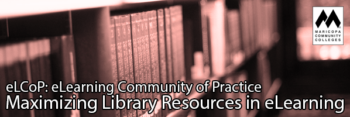
Maximizing Library Resources in eLearning
Special eLCoP: eLearning Community of Practice Session at Mesa Community College
Friday, March 22, 2:00 p.m. – 3:30 p.m.
Sponsored by the MCC Center for Teaching & Learning
Register Now: http://tinyurl.com/eLCoPMarch
eLCoP is composed of faculty and staff dedicated to the research, discussion and dissemination of best practices for eLearning at MCCCD. eLearning includes courses taught both online as well as hybrid, and those using Canvas and alternative delivery methods for teaching and learning. eLCoP is open to all faculty and staff who are interested in positively impacting student learning outcomes through the creation and adoption of eLearning best practices.
(more…)







